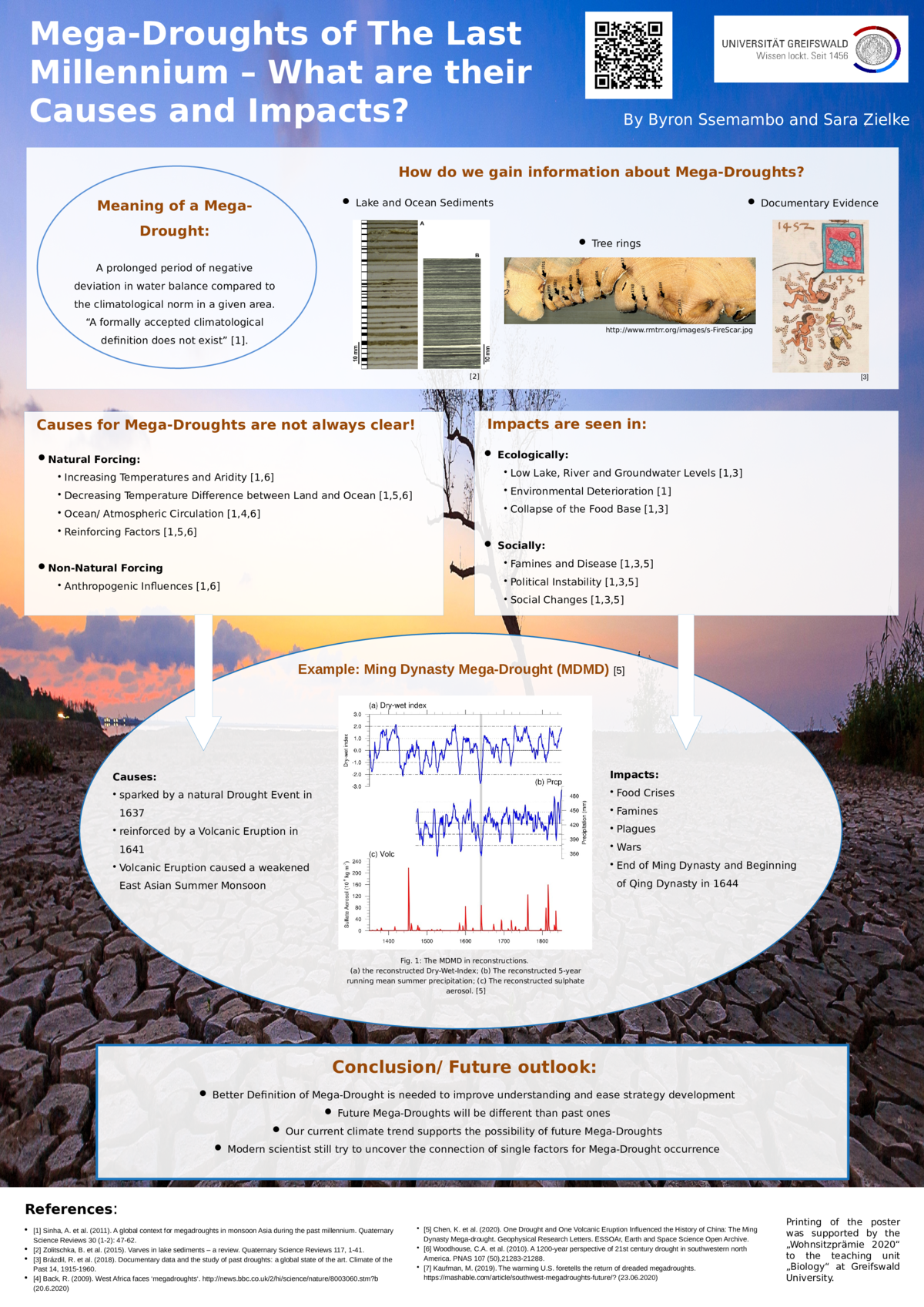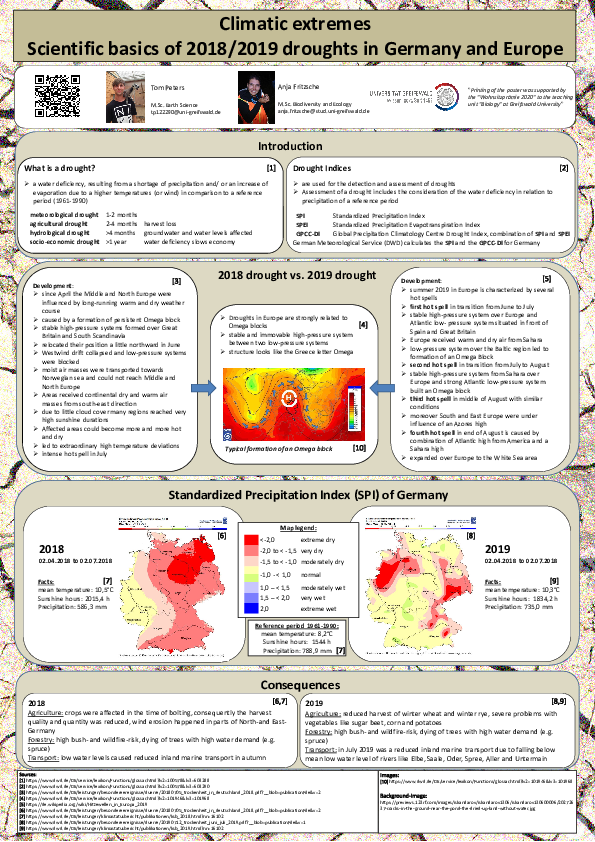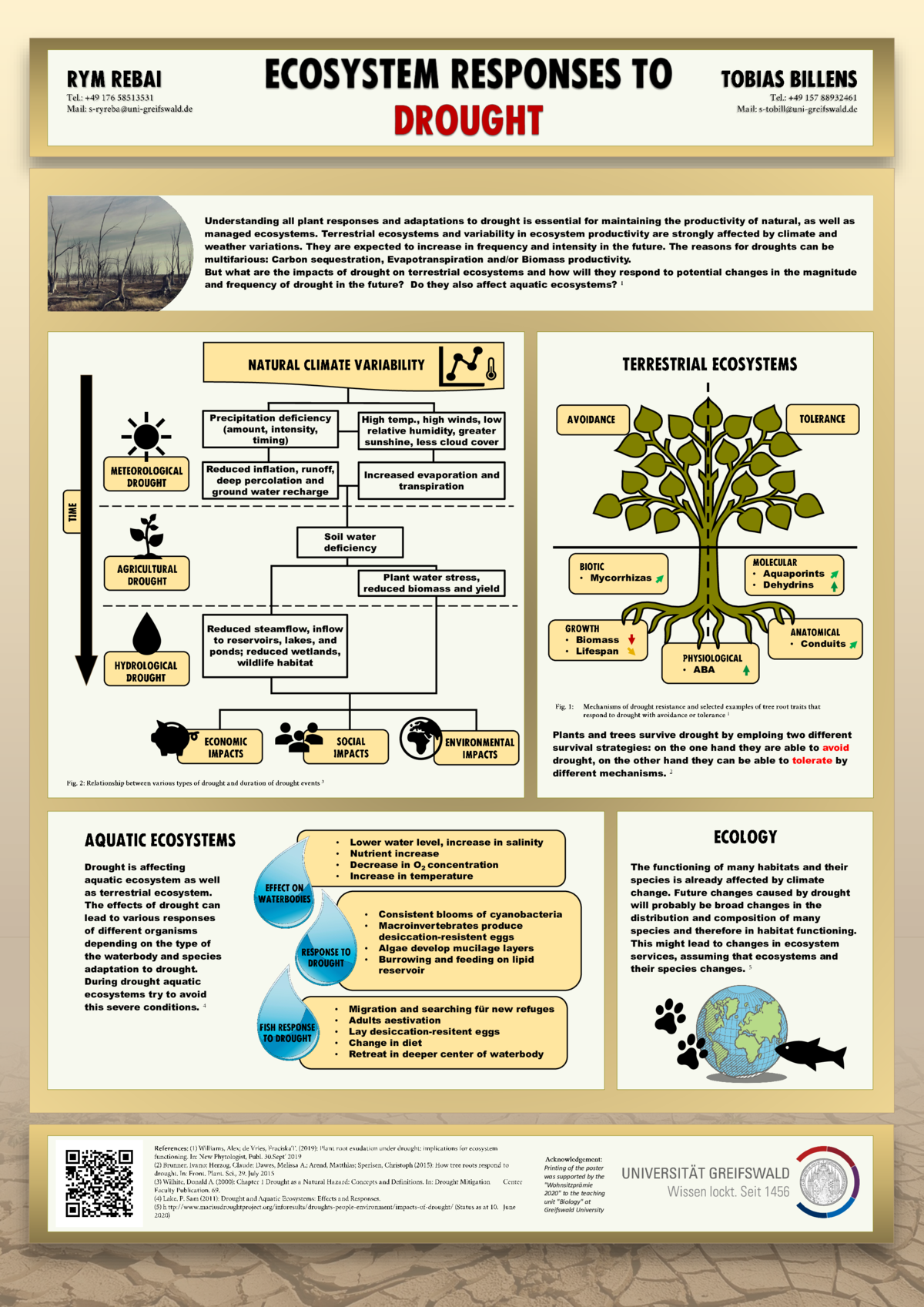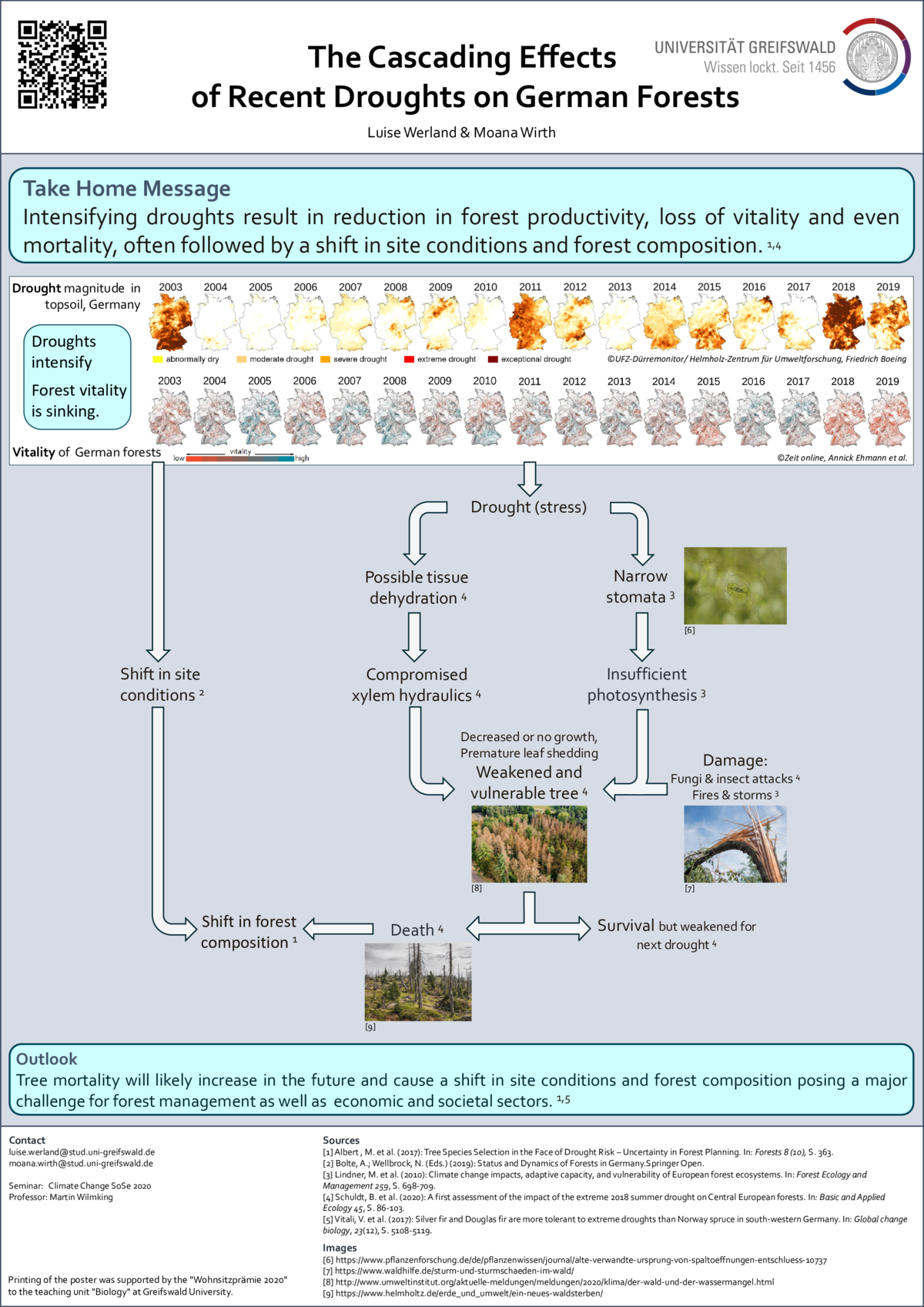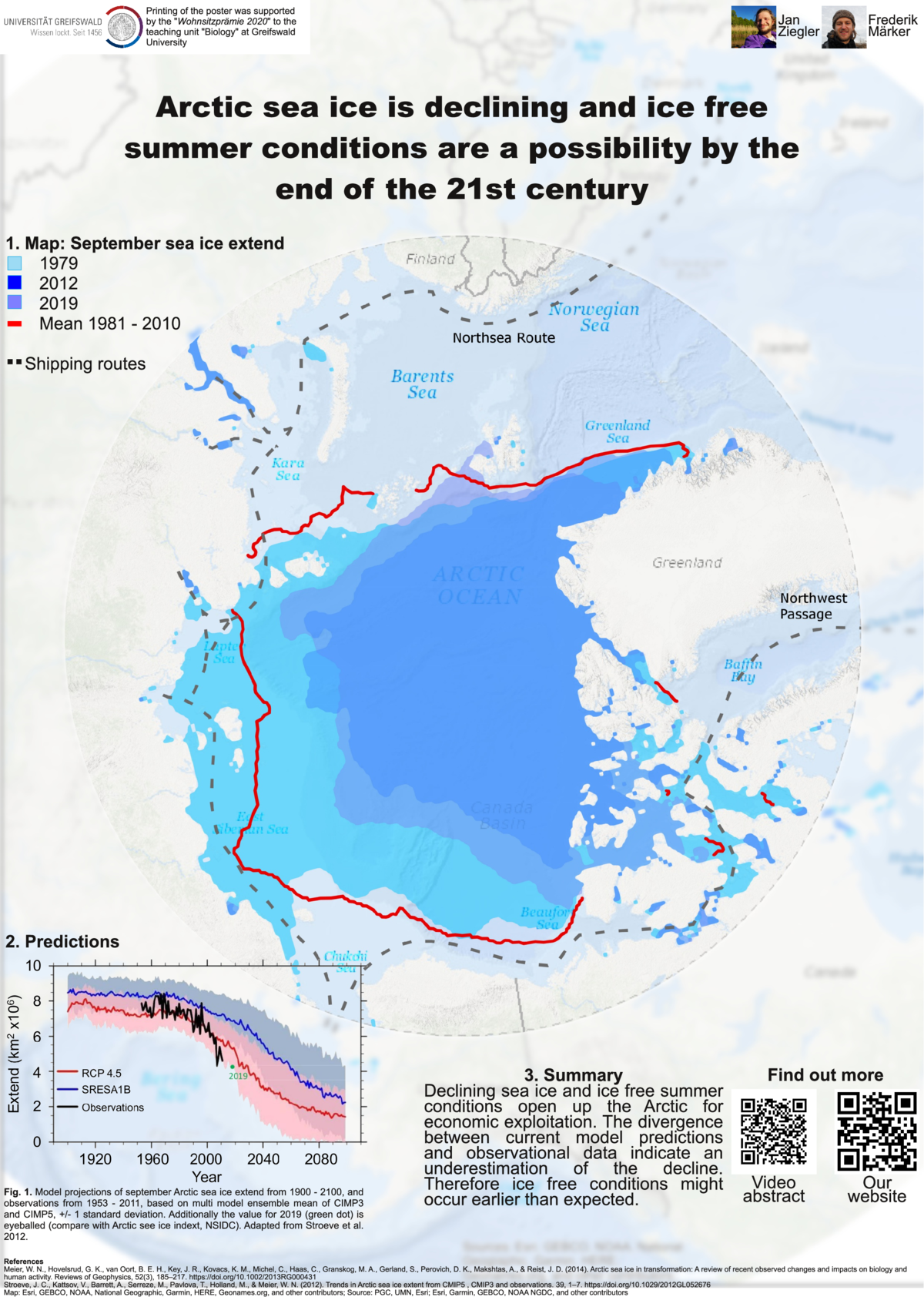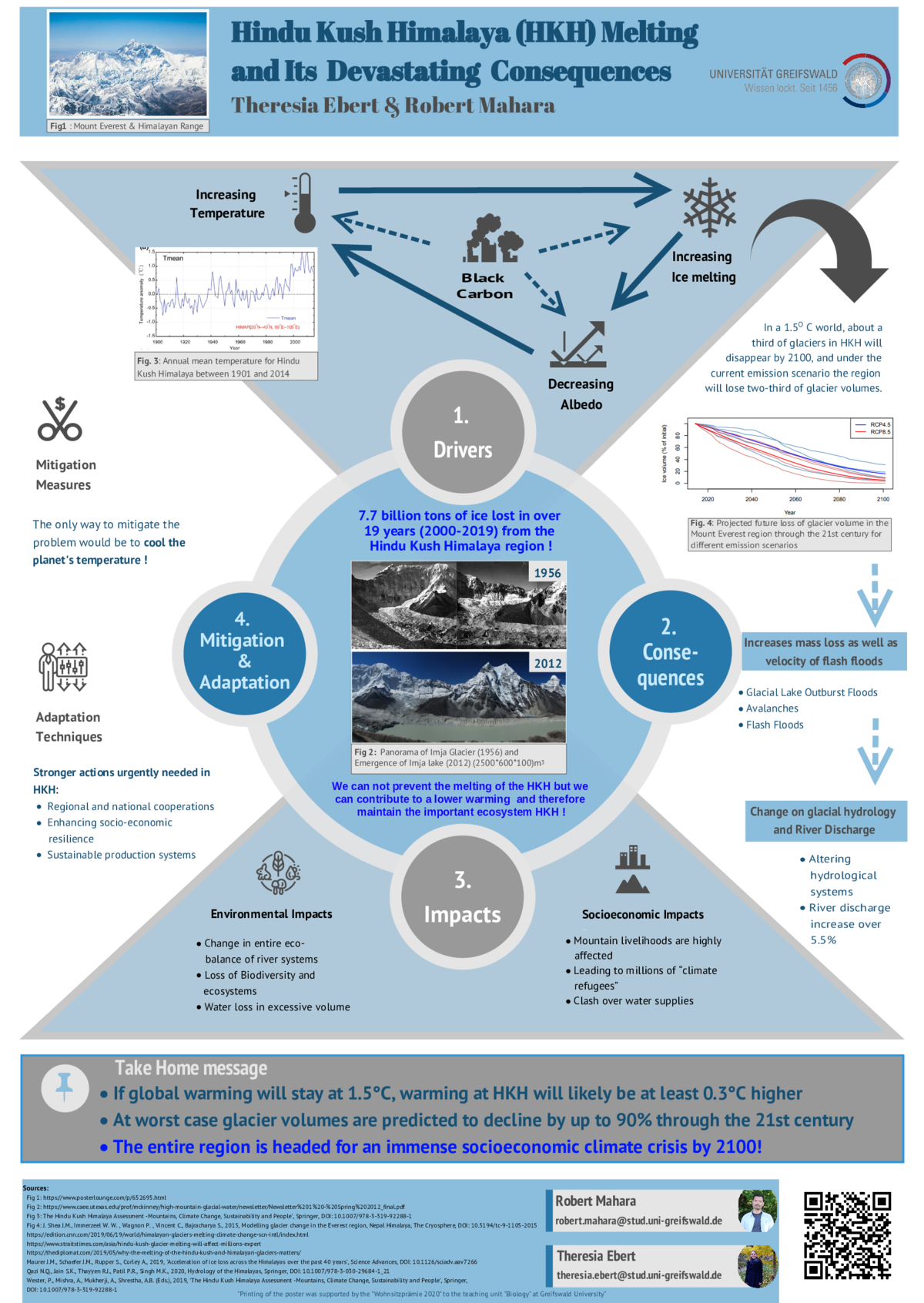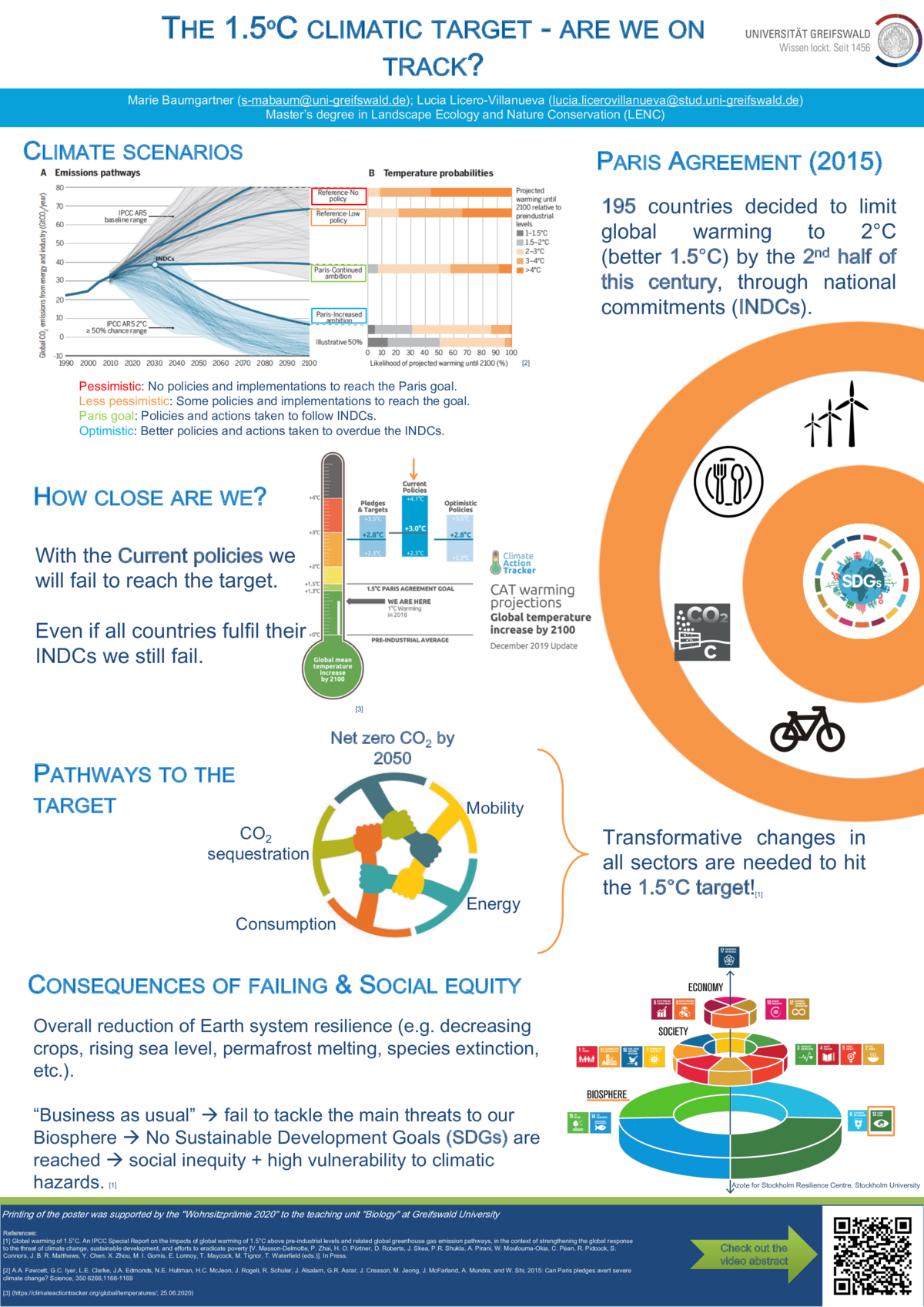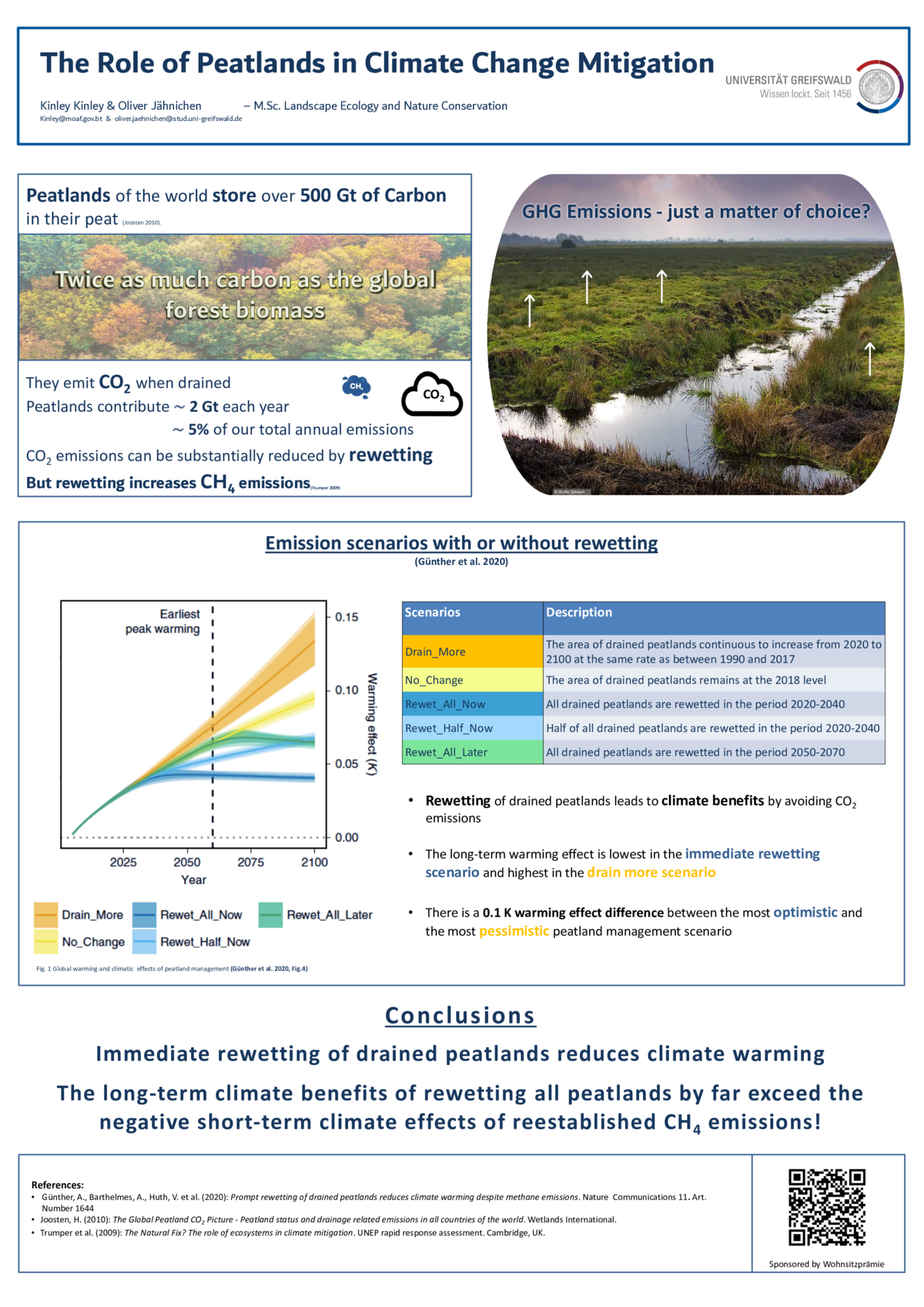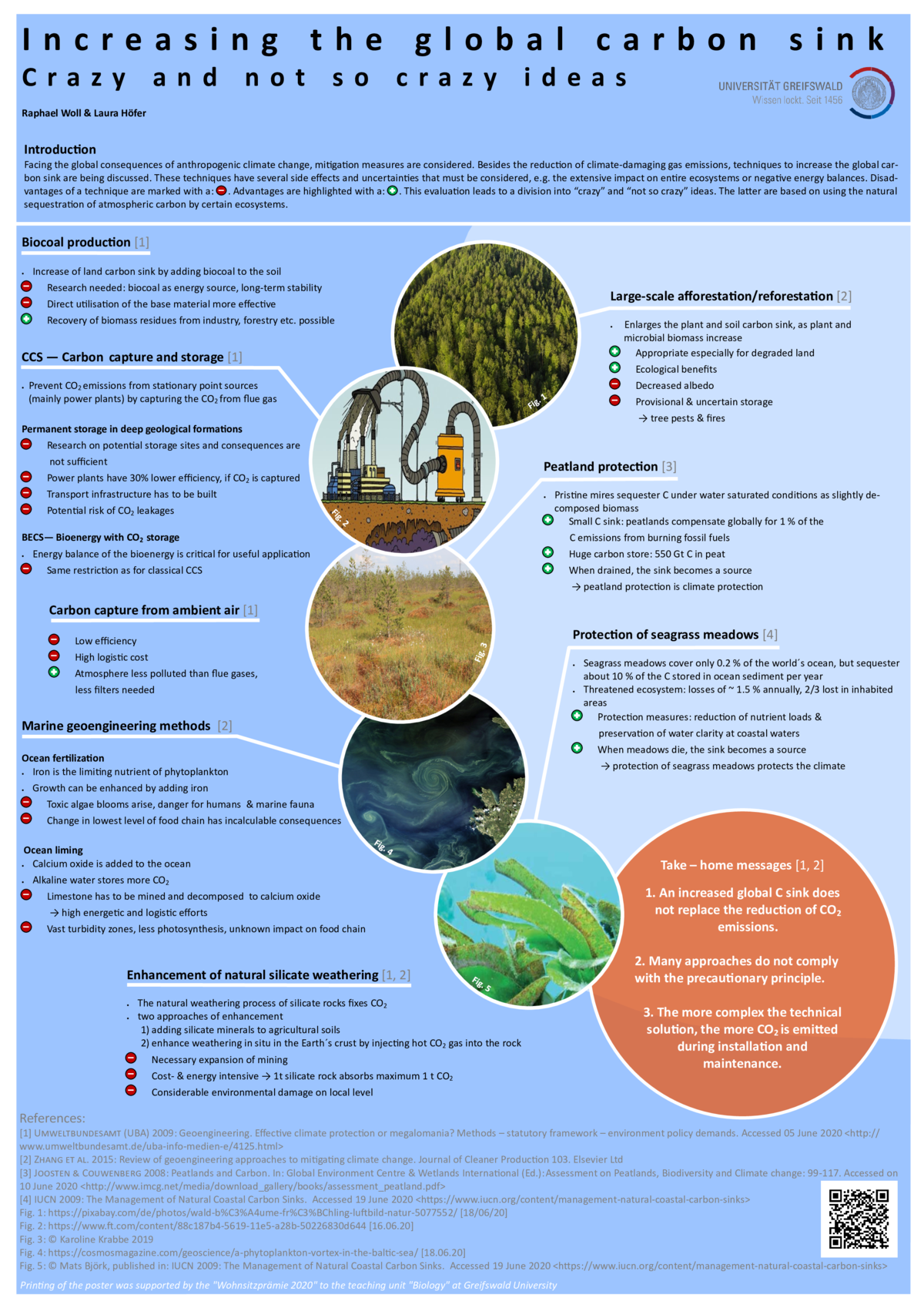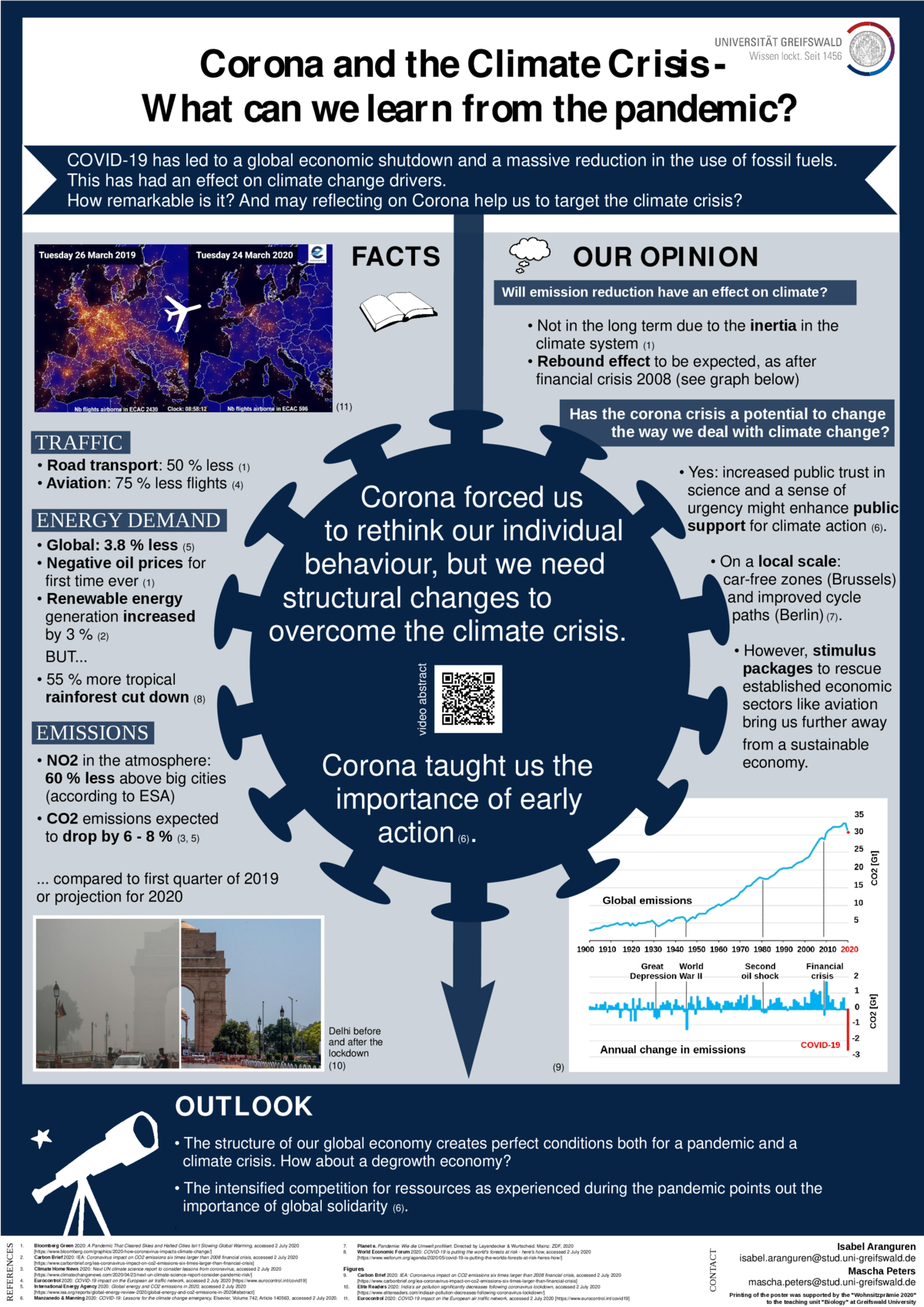
Below you can find all the contributions from students in the summer semester 2020 in the "Climate Change" module from Prof. Martin Wilmking, Ph.D.
For every topic you can find a short overview, the student's poster contribution and a 3 minutes video abstract.
Enjoy the virtual tour.
SESSION 1
Climate Extremes
Mega-droughts of the last millennium – What are their causes and impacts?
We took a look at Mega-Droughts of the last millennium. A way to obtain information about climate variations is to use proxies. They help to answer questions like: What causes such extraordinary drought events? What consequences do they have? What can we learn for the future? Is there a difference between past and current/future Mega-droughts?
Climatic extremes - Scientific basics of the 2018/ 2019 droughts in Germany and Europe
The Poster is focusing on two recent and severe drought events taking place in Germany and Europe in the years 2018 and 2019. We provide definitions, explain measurements, calculations, development, and also the consequences of those large-scale weather events. We then compare the droughts of both years in detail and to the reference time period 1961-1990.
Ecosystem responses to drought
In our poster, we describe several types of droughts as well as ecosystem responses with two examples: 1) tree roots use several strategies to avoid or tolerate drought stress. 2) We also describe aquatic ecosystem responses to drought and how different aquatic species deal with it either by migration or by other strategies.
The Cascading Effects of Recents Droughts on Forests in Germany
Droughts in Germany, recent and in the near future, did and will increase over time in intensity and frequency. For forests, this results in a lot of negative effects, like reduction in forest productivity, loss of vitality, and eventually even mortality. This is followed by a drastic change in forest composition due to new and different site conditions. Therefore, these droughts represent a major challenge for our society, especially in the field of forestry.
Winter flooding - The new risk? Risks and advantages in a future, warmer world.
Floods are known to cause destruction. Over the last decades the number of winter flooding events in Europe has seemingly increased. What influences winter flooding and why is it increasing in a future, warmer world? How can we cope with the new risks and is it even possible to benefit from those changes?
Arctic sea ice - a disappearing phenomenon
Since 1978 Arctic sea ice (ASI) is monitored via satellite-borne multichannel passive microwave radiometers, which provide generally consistent estimates of long term trends. Earlier records are based on proxies. It becomes evident that now ASI-loss is highest in summer and the sustained declining trend is unprecedented in the last 1,450 years. Because of natural variability and a complex feedback system, predictions of when the Arctic will be ice free should be taken with little confidence. Yet ASI seems to respond roughly linear to temperature and models display the possibility of ice free summers by the end of the century.
Himalayan melting and its devastating consequences
The Hindu Kush Himalaya (HKH) region, also called the third pole, contains the world's highest mountains including Mt. Everest. It spreads from Afghanistan to Myanmar. This region is currently facing the rapid melting of ice cover. Glacial ice in the HKH is a global asset and main source of freshwater for more than 1/5 of the world's population.
The main drivers of Himalayan melting are rising global temperatures. The Himalaya will face devastating consequences of greater river flows, floods and outburst of glacier lakes within the next decades, also leading to water scarcity in the mid-term. All of these effects have an immense impact on the societies and the environment of the HKH region.
The collapse of Mayan civilization - a hypothesis based on climate change
There are several hypotheses related to the collapse of the Mayan civilization: Warfare, environmental issues and drought events. Based on the utilization of proxies such as oxygen isotopes, carbon isotopes, and historical proxies researchers defined three different major drought periods: 200 – 300 CE, 820 – 870 CE and 1000 – 1100 CE; which coincide with important changes in the Mayan civilization eventually leading to its collapse.
SESSION 2
Hot topics in climate change research and education
The future of agriculture - Can our fields adapt to Climate Change?
Climate is changing. Here we summarize its impacts on agriculture in North-East Germany as well as the effects agriculture has on climate. We show possible responses to counteract both effects and ask the important questions: Is it possible to feed an increasing population AND save the climate?
The power of online tools: Can apps and online tools be helpful to educate about the impact of CO₂ emissions on climate change?
Carbon dioxide (CO₂) is an important heat-trapping greenhouse gas, which is released through human activities as well as natural processes. It is nowadays a well-known fact that CO₂ emissions have an impact on climate change and global warming. A large number of apps and online tools have been developed to illustrate the extent of the emissions, to provide information, and to give suggestions for making one's own lifestyle more CO₂ neutral. We want to find out whether the tools meet these requirements. Therefore we have launched a survey - and share our results on the poster.
Lessons learned on climate change education: How to move from science to action?
Current climate change education resides primarily in a content-led type of learning focused on scientific knowledge transfer. But, transmitting knowledge alone is not enough to ensure environmentally responsible behavior. We argue that science-based climate change education is failing to achieve meaningful change by neglecting the complexities of climate change as a socio-scientific issue. A more holistic climate change education that considers the social, political, cultural, and economic dimensions of climate change, beyond the scientific phenomenon, is needed. To do so, we recommend four basic components of a meaningful climate change education.
The 1.5ºC climatic target - are we on track?
In 2015, 195 countries met in Paris to find ways for a more sustainable future and a resilient Earth. They agreed on a 2°C warming (or less) target by the 2nd half of this century. Signing countries committed to CO₂ emission targets. The IPCC 1.5°C report provides 4 pathways urging for a transformative change in consumption behavior and fossil fuel demands. Unfortunately, current policies and even “optimistic” projections show that warming can only be limited up to 3°C, then more and ambitious actions are needed.
The role of peatlands in climate change mitigation
Over 500 gigatons of carbon are stored in peatlands across the globe - twice as much as the total forest biomass of the world. When drained, peatlands shift from being carbon sinks to carbon sources. Globally, drained peatlands emit ~2 Gt CO₂ annually by peat fires or microbial peat oxidation, causing ~5% of all anthropogenic greenhouse gas emissions. These enormous CO₂ emissions can be strongly reduced by rewetting. In order to reach climate-neutrality by 2050, all drained peatlands have to be rewetted. This ambitious goal requires serious global effort but offers tremendous possibilities to keep and store carbon in peatlands as a natural climate solution.
Increasing the global carbon sink - Crazy and not so crazy ideas
This poster represents several methods to store carbon. We evaluated the methods and allocated them to the categories "crazy" and not so "crazy".
Cui bono? Identifying credible sources in incredible times
Just as the earth's climate, the political debate about climate change has been heating up. There are substantial financial and ideological motivations of groups involved, questioning the existence of a scientific consensus about human-made climate change. Therefore, the issue is prone to fake news. With this poster, we would like to encourage a critical way of thinking about sources of information as well as provide a guideline to evaluate credibility.
Corona and the Climate Crisis - What can we learn from the pandemic?
The Corona pandemic has led to dramatic changes in our daily life and it clearly has had an effect on the global economy. The shutdown of whole cities and industries has led to a decrease in CO₂ emissions. What does that mean for our climate? And the other way around: How does the climate crisis affect the occurrence of pandemics such as COVID-19? Must policies aiming at pandemic prevention also target the climate crisis?

